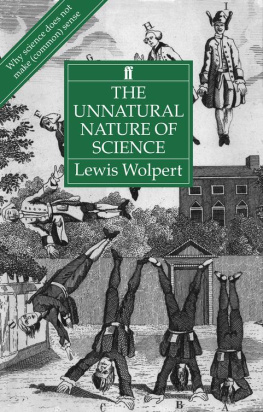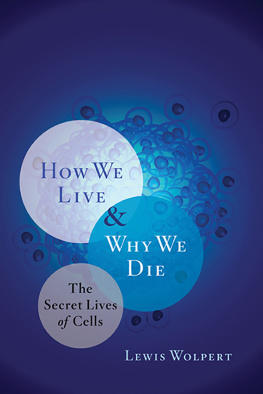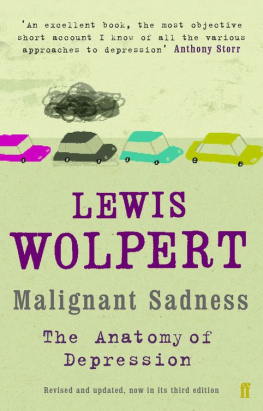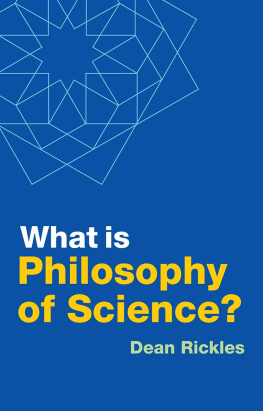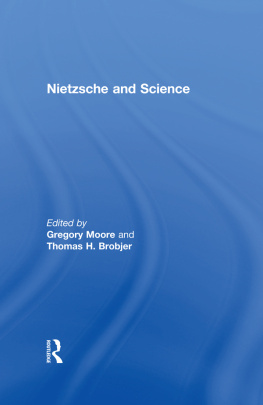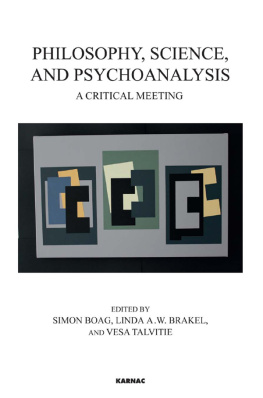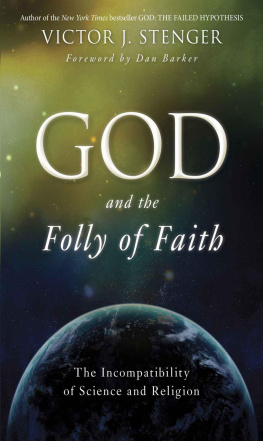T his book has its origin in dissatisfaction and a puzzle. The dissatisfaction is with the public image of science and with much of the writing about science in the media as well as that by academics including philosophers and sociologists. The puzzle is why the nature of science should be so misunderstood and why non-scientists have so much difficulty understanding scientific ideas. This lack of understanding seemed to be linked to a certain fear of and even hostility to science itself.
So I have tried to present science in a new light, which I hope will help to resolve some of these problems. By dealing with so broad a topic as the nature of science, I have inevitably touched on areas in which I have no formal training such as philosophy, psychology and history. I am by profession a research biologist in the field of embryology, and my approach can best be characterized as that used in natural history. I have therefore sought much advice, some of which is acknowledged below, and I am very grateful to everyone who has helped me. I am also indebted to Warwick University for inviting me to give the 1990 Radcliffe Lectures on Science: An Unnatural History, which laid the foundations for what is presented here.
I thank Percy Cohen, Stephen Cang, Patricia Farrar, Christopher Gardner, Jonathan Glover, Mary and Jack Herberg, Judy Hicklin, Frank James, Jonckheere, Roger Jowell, Michael Kidron, Roland Littlewood, Lauro Martines, Arthur Miller, Timothy McDermott and Mary Tuck.
Maureen Maloney needs special thanks for her patience in preparing the manuscript.
I am also specially indebted to my editors, Bob Davenport and, foremost, Susanne McDadd.
Knowledge has killed the sun, making it a ball of gas with spots The world of reason and science this is the dry and sterile world the abstracted mind inhabits.
D.H.Lawrence
Modern science abolishes as mere fiction the innermost foundations of our natural world: it kills God and takes his place on the vacant throne so henceforth it would be science that would hold the order of being in its hand as its sole legitimate guardian and so be the legitimate arbiter of all relevant truth People thought they could explain and conquer nature yet the outcome is that they destroyed it and disinherited themselves from it.
VaclavHavel
A public that does not understand how science works can, all too easily, fall prey to those ignoramuses who make fun of what they do not understand, or to the sloganeers who proclaim scientists to be the mercenary warriors of today, and the tools of the military. The difference between understanding and not understanding is also the difference between respect and admiration on the one side, and hate and fear on the other.
Isaac Asimov
S cience is arguably the defining feature of our age; it characterizes Western civilization. Science has never been more successful nor its impact on our lives greater, yet the ideas of science are alien to most peoples thoughts. It is striking that about half the population of the United States does not believe in evolution by natural selection and that a significant proportion of British citizens does not think the earth goes round the sun. And I doubt that of those who do believe the earth moves round the sun, even one person in 100,000 could give sound reasons for their conviction (the evidence and the arguments for such a belief are in fact quite complex). Indeed, many people accept the ideas of science because they have been told that these ideas are true rather than because they understand them. No wonder the nature of science is so poorly understood. Instead it is viewed with a mixture of admiration and fear, hope and despair, seen both as the source of many of the ills of modern industrial society and as the source from which cures for these ills will come.
Some of the anti-science attitudes are not new: Mary Shelleys Dr Frankenstein, H. G. Wellss Dr Moreau and Aldous Huxleys BraveNewWorld, for example, are evidence of a powerfully emotive anti-science movement. Science is dangerous, so the message goes it dehumanizes; it takes away free will; it is materialistic and arrogant. It removes magic from the world and makes it prosaic. But note where these ideas come from not from the evidence of history, but from creative artists who have moulded science by their own imagination. It was Mary Shelley who created Frankensteins monster, not science, but its image is so powerful that it has fuelled fears about genetic engineering that are very hard to remove.
Current attitudes to science indicate both ambivalence and polarization. Surveys confirm that there is much interest in, and admiration for, science, coupled with an unrealistic belief that it can cure all problems; but there is also, for some, a deep-seated fear and hostility, with several lines of criticism. Science is perceived as materialist and as destructive of any sense of spiritual purpose or awareness; it is held responsible for the threat of nuclear warfare and for the general disenchantment with a modern industrial society that pollutes and dehumanizes. The practitioners of science are seen as cold, anonymous and uncaring technicians. The fear of genetic engineering and the manipulation of embryos looms large, and the image of Dr Frankenstein is increasingly embellished. The image of scientists themselves remains as stereotyped and inaccurate as ever: when not crazy, they appear bedecked in a white coat, wearing spectacles, and wielding a test-tube. The media usually present scientists as totally anonymous and character-free and give little insight into the way in which they work. Scientists are still widely perceived as being like Mr Gradgrind in Charles Dickenss HardTimes, interested only in facts and yet more facts, the collection of which is the hallmark of the scientific enterprise, and the overwhelming burden of which seems to drive them into increasingly obscure specializations. Almost as misleading is the idea that there is a scientific method that provides a formula which, if faithfully followed, will lead to discovery. Any idea of creativity in science which is rare is linked, romantically and falsely, with that of artistic creativity.
Thirty years ago, C. P. Snow suggested that there were two separate cultures: one relating to science and the other to the arts and humanities. He was criticized for his use of the term culture. Some people even argue that science is not part of culture at all: following Nietzsches claim that science, with its reductionism and materialism, has deprived man of his special status, it seems to some that only an idea of culture that actually excludes science can restore mans dignity. Whatever the definition of culture, however, Snow was right in emphasizing that the culture of science was different. What he did not do was to give any insight into why this should be.
Some of the hostility to science may be explained by the American literary critic Lionel Trillings comment on the difficulty non-scientists have in understanding science: This exclusion of most of us from the mode of thought which is habitually said to be the characteristic achievement of the modern age is bound to be experienced as a wound to our intellectual self-esteem.
The central theme presented in this book is that many of the misunderstandings about the nature of science might be corrected once it is realized just how unnatural science is. I will argue that science involves a special mode of thought and is unnatural for two main reasons, which are developed in Chapter 1. Firstly, the world just is not constructed on a common-sensical basis. This means that natural thinking ordinary, day-to-day common sense will never give an understanding about the nature of science. Scientific ideas are, with rare exceptions, counter-intuitive: they cannot be acquired by simple inspection of phenomena and are often outside everyday experience. Secondly, doing science requires a conscious awareness of the pitfalls of natural thinking. For common sense is prone to error when applied to problems requiring rigorous and quantitative thinking; lay theories are highly unreliable.

